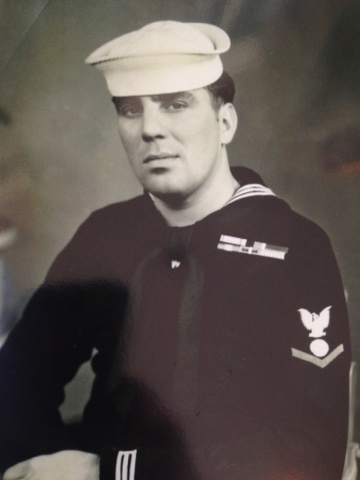by Liv Stecker
Joe Theiss had only been out of high school for six months, working in the Columbia Basin in the heart of Central Washington agriculture when he enlisted in the U.S. Navy to avoid being drafted into the army. It was 1950, North Korea's communist regime had swept into South Korea in what the United States Military viewed as the first step to global communist takeover. For Joe, the idea of serving his time on a boat seemed better than the boots-on-the-ground alternative in the infantry. The Navy "seemed a lot cleaner than walking around on a battlefield!" Joe laughs. And he wasn't wrong.
After basic training, Joe was sent to electrician school in San Fransisco and then assigned to the USS Tingey, DD-539, a 2100 ton destroyer. For three years Joe worked onboard the Tingey as an electrician, standing watches on the switchboard while the destroyer supported anti-mining mission and shore raids off the coast of Korea. The ship made two trips to the Phillipines while Joe was onboard, as well as time near Tokyo and Hong Kong, establishing a visible U.S. presence in the local waters. "We'd go out and come back there [to the islands], that was about the time the Korean War was winding up." He reminisces.
Aboard the USS Tingey, Joe witnessed both support missions and firing operations over enemy ground. He recounts the story of blowing up both ends of a tunnel after train full of Japanese troops disappeared inside of it. Small raiding parties would go inland in boats that were identified by codes of black and white flags. If the combination of flags didn't match the code, the ship was instructed to destroy the boat. The destroyer was equipped with 5 inch cannons and submarine depth charges that performed both offensive and defensive missions overseas.
Joe had a bunk at the end of a row on the lee, or left side of the ship. "I hate to say it but I kind of enjoyed it," he smiles. "Really I had a pretty goood life down there. I've got no complaints." He tells stories of WWII vets that re-enlisted and came on board to work with the new recruits. One of the Tingey's missions was to recover U.S. Bomber pilots after they were shot down. If the planes were hit over Korea, the pilots were instructed to wait to eject from their disabled jets until they were over the open ocean. The Tingey would send a rescue mission to collect the floating pilots and they would return him to his aircraft carrier in exchange for the pilot's weight in ice cream. At the time, carriers were equipped with ice cream making technology that the destroyers lacked. Joe said they had ice cream at least three or four times during his tour, upholding the tradition that began before World War II, after alcohol was banned on U.S. Navy Ships.
An armistice was signed in 1953, bringing an unresolved end to the bloody dispute. The following year, Joe returned home to Cashmere, Washinton, the little orchard town where he was born in 1931. Straight away he got a job with Keyes Fibre outside of Wenatchee, a company that produces cardboard fiber trays for apples and other fruit for boxing. For 34 years Joe worked at Keyes, doing every job in the factory - one of the earliest recycling businesses operating in the United States. Keyes began using old newspaper to create molded fiberboard trays before the turn of the 20th century, opening plants in Washington after World War II.
One of six siblings, Joe had three brothers in the Navy, one in the Army and two sisters. His father was a logger when Joe was born, and then managed an apple warehouse in the Cashmere area. His parents were married in Missouri, where his father met his mother. The family built a hunting cabin at a campsite in central Washington where the boys and their father spent time during hunting season.
Joe never married, explaining that all the girls he liked wanted him to move, but he liked his life in the Wenatchee valley. "Any time it got anywhere near serious, they wanted to move to Seattle and work for Boeing. But I didn't want to work for Boeing." and so he stayed. He bought a house and a boat that he would use in his spare time, bass fishing on Lake Roosevelt.
Ever the optimist, Joe looks back on his time in the Navy and his life in the Wenatchee area with great fondness. "It was a good life," Joe says, "I enjoyed it all." Recently, Joe suffered a stroke that left him with temporary amnesia. His memory recovered, along with his mobility and he still keeps active. He relocated to Colville to live near his younger brother, and is now a resident at Parkview Assisted Living, where he still gets to go out fishing on Lake Roosevelt from time to time on a boat provided for excursions. Joe has no regrets in his life, making the most of every opportunity that was handed to him and reminding us all to enjoy the ride, and the ice cream.


No comments:
Post a Comment